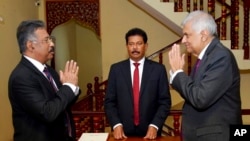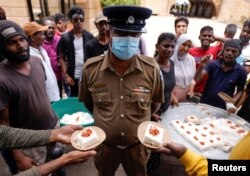Prime Minister Ranil Wickremesinghe has been sworn in as Sri Lanka's interim president a day after Gotabaya Rajapaksa, who fled to Singapore, stepped down as the country's top leader.
Rajapaksa's resignation was formally accepted Friday by the speaker of parliament, who said that a new president will be elected within a week.
The 73-year-old Rajapaksa's resignation marks a major victory for a protest movement that had demanded his exit after an economic crisis left the island nation struggling with runaway inflation and severe shortages of fuel and medicine, as foreign exchange reserves ran out.
In the capital, Colombo, the jubilant celebrations that erupted overnight after the news that Rajapaksa had resigned, continued in the morning with many calling it a "historic moment." At the main protest site that has sprung up in the city, outside the presidential secretariat, volunteers cooked and distributed a traditional rice milk pudding that is served at celebrations.
"I am a bit numb, but I am really relieved. Rajapaksa was incompetent and had to go. He failed to provide for the people although he had such a huge majority in parliament," said Udith Erosh, an activist and protester. "But the real struggle begins now to move the country forward from the utter chaos and humanitarian crisis that we are facing."
The movement began with small candlelight vigils and gradually swelled to include university students, professionals, trade unionists and even Buddhist monks, who were once Rajapaksa's staunchest supporters. Many were first-time protesters, who said they were forced to come out into the streets because of the hardships they were facing.
Rajapaksa and his family, who held key posts in the government, including that of prime minister and finance minister, controlled about 70 percent of the national budget and are widely blamed for mismanagement leading to the country becoming virtually bankrupt. It was a rude shock for a nation once hailed as a success story among developing countries with a well-educated population and a large middle class.
The country now faces the tough task of transiting to a new administration and repairing the broken economy. Parliament will convene Saturday to begin the process of electing a new president, who will serve for the two years that remain of Rajapaksa's term.
Saying that the election will be done in a "swift and transparent manner," the speaker of parliament, Mahinda Yapa Abeywardena, called on people to "create a peaceful atmosphere" to implement the democratic process.
His appeal came after a chaotic week, in which protesters stormed the president's and prime minister's residences and offices, after Rajapaksa defied monthslong calls to step down. They only vacated the buildings on Thursday, saying they had achieved their objective of demonstrating people's power and wanted to ensure their struggle remains peaceful.
In a statement, Wickremesinghe said he will initiate steps to bring constitutional changes to clip the enormous powers vested in the president, and to strengthen law and order.
Seen as being close to the Rajapaksas and accused of alleviating pressure on Gotabaya Rajapaksa to resign after he accepted the prime minister's job in May, Wickremesinghe also is under pressure from protesters to quit.
Wickremesinghe had earlier said he will step down when a new administration is in place and called on political parties to elect a new unity government, but the ruling party has said he will be their choice for the next president. The main opposition party wants its leader, Sajith Premadasa, to head the country.
Political observers said it is imperative for lawmakers to set aside their differences and arrive at a consensus.
"The hope is that the political parties can come together because restoring the economy has to be a collective effort and everyone must share the responsibility," said Jehan Perera at the National Peace Council research group in Colombo.






